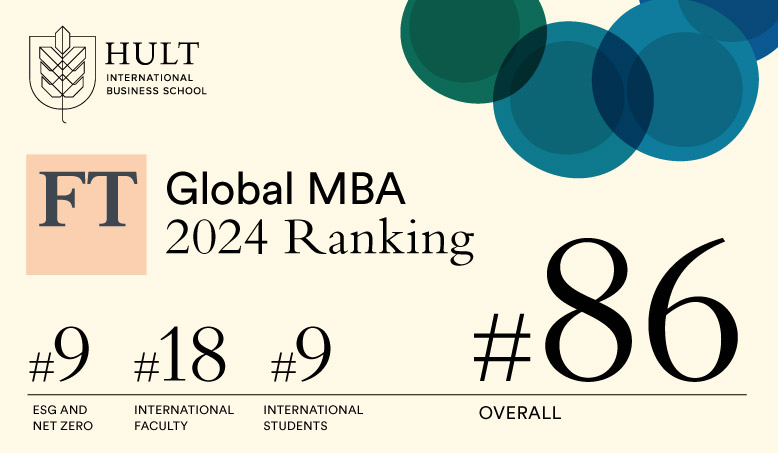We are thrilled to share that Hult International Business School has been recognized in the prestigious Financial Times Global MBA Rankings, 2024. Placing #86, this achievement is a testament to the quality and impact of Hult’s MBA program and a clear demonstration of our commitment to delivering a transformative and globally relevant business education.
Our celebration doesn’t stop at breaking into the top 100. We’ve also earned commendable rankings in several categories that are central to the Hult DNA—ESG (Environmental, Social, and Governance) and Net Zero, international students and faculty, and the global experiences we offer through our courses.
The Financial Times recognized Hult in several categories including:
– #9 for ESG and Net Zero
– #9* for International Students (%)
– #11 for Sector Diversity
– #17 for International Mobility
– #18 for Carbon Footprint
– #18* for International Faculty (%)
– #22 for International Course Experience
*calculated rank based on FT MBA data
The rankings of individual categories provide a comprehensive picture of what we excel at. Let’s take a closer look at the factors that contributed to this performance …
#9 for ESG and Net Zero, #18 for Carbon Footprint
In line with the global emphasis on sustainability and responsible business practices, the Financial Times has introduced new categories into its MBA ranking. These include Environmental, Social and Governance (ESG) and Net Zero teaching rank, and Carbon Footprint. At Hult, we firmly believe in the power of business to drive meaningful change and tackle the world’s most pressing issues. Sustainability, in its broadest sense, is ingrained in everything we do—from the way we run our campuses to the knowledge and skills we impart to our students. You can read more details on our ERS and Net Zeo plans on our website.
#9* for International Students (%), #18* for International Faculty (%)
With a student body of over 170 nationalities, Hult provides a richly diverse learning environment that prepares them for global business careers. The importance of international faculty cannot be overstated in the global business education context. Having a global perspective in the teaching staff ensures that our students are exposed to a range of ideas, experiences, and approaches that reflect the diverse world of international business. This ranking signifies the range of backgrounds, cultures, and perspectives that our students and faculty bring to our classrooms.
#17 for International Mobility, #22 for International Course Experience
Our robust performance in the International Mobility and International Course Experience categories is a testament to how we provide our students with opportunities to study across several continents, opening up a world of possibilities for their careers. This exposure to diverse business climates and cultures equips our students with valuable skills to adapt and excel in any international work environment.
What is the Financial Times Global MBA Ranking?
The Financial Times Global MBA Ranking is an annual ranking of the top 100 MBA programs in the world, conducted by one of the world’s leading global business publications. The ranking is based on a variety of factors, including graduate salary, career progression, faculty research capabilities, gender diversity, and more. It’s a prestigious list and being included in it is a testament to the quality of an MBA program.
The Financial Times MBA Ranking provides an objective, comparative measure of the quality of MBA programs globally. For prospective students, it serves as a guide to selecting the right program for their career ambitions. For universities and business schools, it’s a valuable benchmark against which they can measure their performance and strive for continuous improvement.
How are programs evaluated by the Financial Times?
The methodology used in the Financial Times Global MBA Ranking involves a comprehensive evaluation of each program across several categories. These categories include alumni salary three years after graduation, career progression, faculty research capabilities, gender and international diversity, and more recently, sustainable and responsible business education. The relative weight of these factors can vary, but a strong performance across all categories is necessary to achieve a high ranking.
Browse Hult’s range of top-ranked full-time and part-time MBAs


